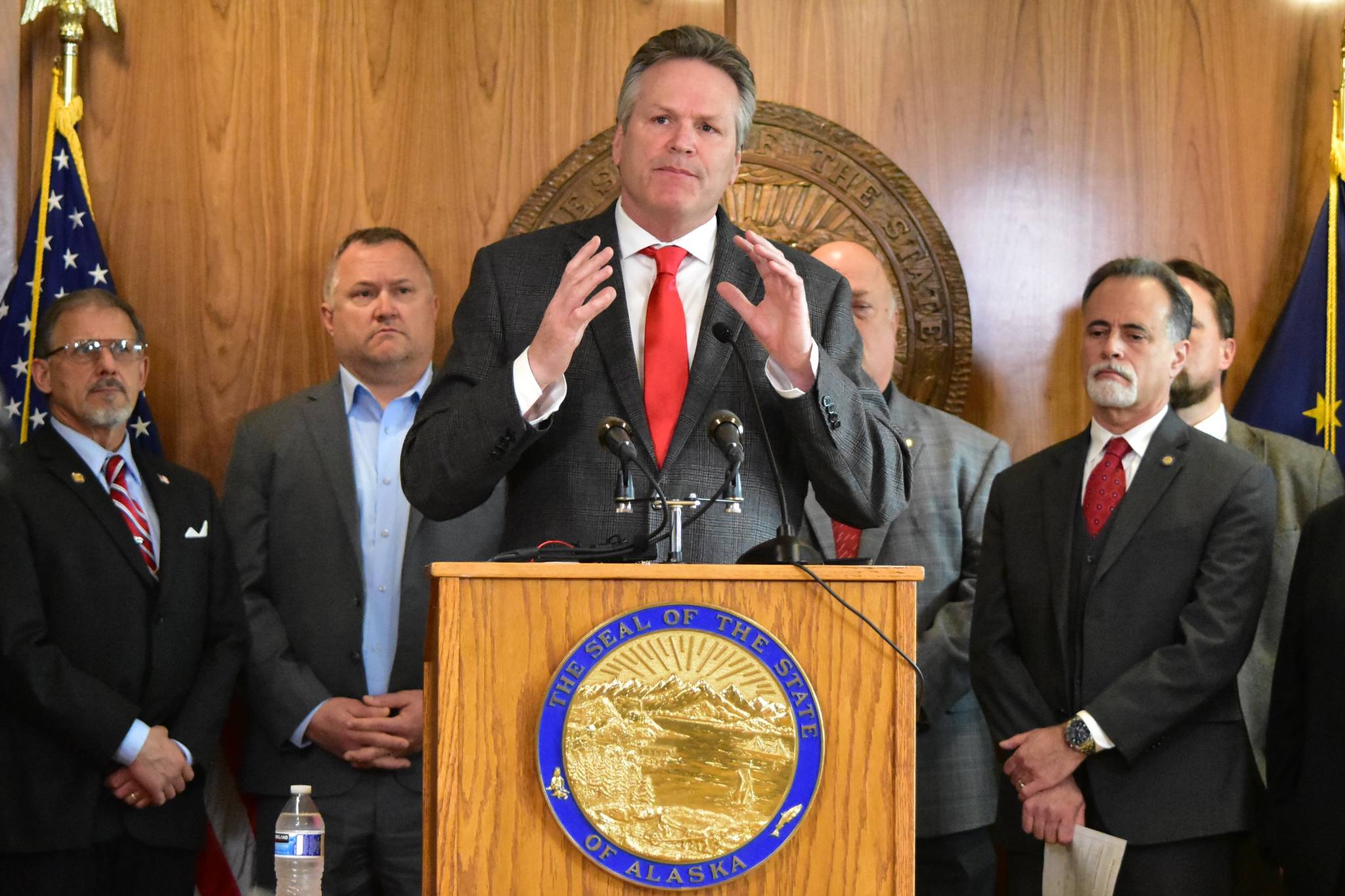Gov. Mike Dunleavy announced changes to a proposed constitutional amendment he says will put the state on better fiscal footing.
Dunleavy has suggested combining all the accounts of the Alaska Permanent Fund into a single account, and Wednesday suggested adding the Power Cost Equalization fund into that single account.
Dunleavy proposed an amendment in February to combine the Earning Reserve Account into the main account of the Alaska Permanent Fund to create a larger single fund. Once combined, the state would be limited to a yearly draw of 5% of market value on the earnings on the combined fund, and then split evenly between the Permanent Fund Dividend and state spending. The governor has said that structure would limit state spending while ending the PFD debate.
Dunleavy proposed similar amendments in 2019, but they weren’t passed by the Legislature. Debates over the PFD had “taken the air out of the room” Dunleavy said, and continue to prevent Alaskans from addressing other critical issues.
“Imagine a world where we’re not wrestling over the PFD,” Dunleavy said at a news conference at the Alaska State Capitol. “Imagine what that will do in terms of what we can achieve.”
Surrounded by mostly Republican lawmakers from both the state House and Senate, Dunleavy said there is an opportunity to put the state on a better fiscal path. The governor and several lawmakers repeatedly called the amended proposal “the first step” toward better management of Alaska’s finances.
The PCE fund would be managed by the Alaska Permanent Fund Corporation, similar to how the corporation manages Alaska Mental Health Trust Authority funds, said Lucinda Mahoney, commissioner of the Department of Revenue.
[‘Time is running out’ lawmaker warns of state finances]
The proposed constitutional amendment would have to be passed by two-thirds of both bodies. That’s 27 votes in the House of Representatives and 16 in the Senate. Once passed by the Legislature, constitutional amendments also must be passed by a vote of the people, which Dunleavy said is one of the most important things to him.
Lawmakers have been divided over how to calculate payments for the PFD, with some saying the state must follow a formula laid out in statute, while others contend that a 2017 Alaska Supreme Court Case shows the dividend is an appropriation.
Several Republican senators were removed from their committee positions last session after they violated an agreement to vote as a bloc. Sen. Mike Shower, R-Wasilla, said he voted against the budget because it had not contained a statutory amount for the PFD. But Shower stood with the governor Wednesday, saying there had been an effort to follow the statutory amount but not the political support.
“I have been strident on the statutory formula, but we don’t have the votes,” Shower said at the conference.
Sen. Shelley Hughes, R-Palmer, was also removed from committee assignments for her vote, but spoke in support of the proposal.
Dunleavy said several times at the conference the proposal is a starting point and would require compromise by all parties but in the end would create a stable fiscal path for Alaska.
The only non-Republican to stand behind Dunleavy at the conference was Lyman Hoffman, D-Bethel, whose rural district relies heavily on the PCE program. Hoffman, the Legislature’s longest-serving member, said he’s seen state funds dry up quickly and something needs to be done.
“I’m concerned that if we don’t take action, those (PCE) dollars can be burnt up just as quick,” Hoffman said.
Hoffman is caucusing with the Senate Republican Majority this session.
House Speaker Louise Stutes, R-Kodiak, remained seated during Dunleavy’s speech but rose to speak, saying briefly the House Majority Coalition was willing to discuss the proposal.
In a meeting with reporters, Stutes said she was optimistic about the proposal, and willingness to discuss the issue is a positive sign. But there were still elements of the proposal that needed to be worked out, Stutes said.
“(The proposal)’s got a lot of the components that have been contentious, we need to remove those contentious components so everybody gets a little bit of a win,” she said.
Stutes is a Republican but has caucused with Democrats and independents for the last two sessions. She said the governor’s office is communicating more with the Legislature, and there was an improved working relationship to discuss contentious issues.
Dunleavy said he hoped the Legislature will move quickly to pass the substitute which was being submitted into the Senate Judicial Committee Wednesday afternoon. The Legislature is still trying to finish passing a budget before the May 19 deadline, but the governor said lawmakers can move quickly when they want to.
If the budget is not passed within the 121-day deadline a special session will have to be called. While the governor did not say there would be a special session, he said one might be useful to allow lawmakers more time to discuss issues like the PFD and how to appropriate additional federal funding.
“We’re going to see what the next couple days do, when we put our minds to something we can get things done,” Dunleavy said.
• Contact reporter Peter Segall at psegall@juneauempire.com. Follow him on Twitter at @SegallJnuEmpire.

